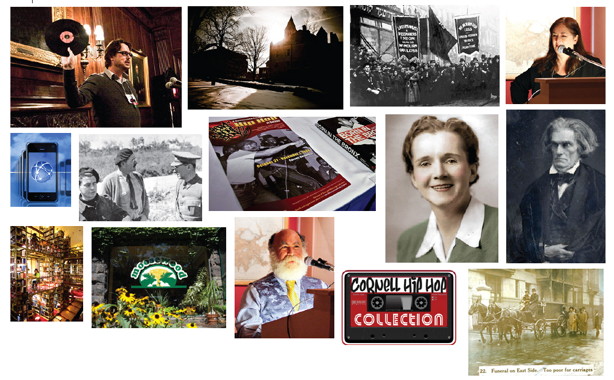COVER STORY SIDEBAR
Salons highlight the role of research libraries

Bits of history that highlighted Library Salon gaherings.
Enhancing the "life of the mind" while promoting Cornell University Library's rich historical offerings beyond its physical walls is the driving force behind library salons.
Starting in 2008, Cornell Library Salons have gathered alumni and friends for discussions around a dazzling diversity of topics. Most recently, alumni in Beverly Hills, San Francisco and New York were invited to hear about the origins of the Moosewood Collective, which inspired the vegetarian and vegan movements of the 1970s.
In October 2011, in commemoration of the sesquicentennial of the Civil War, the library invited Stephan Loewentheil, J.D. '75, a noted photography collector and enthusiast, to showcase his collection of the photojournalism of Mathew Brady, who produced some of the 19th century's most iconic images.
"As I imagined this series of salons, it really was in the historical tradition of literary salons devoted to the life of the mind," says Anne Kenney, the Carl A. Kroch University Librarian. "We thought of this as an opportunity to engage Cornell alumni and friends in intellectual discussions on a range of topics, from research, tradition and current events to big ideas – particularly as they relate to the role of research libraries."
The Moosewood salon has been well received, Kenney said, perhaps due to the topic's ability to evoke fond memories among Cornellians past and present. But beyond the happy reminiscences, the salons also seek to exercise consciousness around seminal events – for example, the Triangle Factory fire of 1911.
The deaths of mostly immigrant workers during that tragedy helped galvanize the nation behind issues of worker safety and unions. The library salon held in March 2011 commemorated the 100th anniversary of the fire. A website with history, documents and images from the event drew from Cornell's Kheel Center for Labor-Management Documentation and Archives.
The library salons are geared particularly toward engaging Cornell alumni in the library's intellectual offerings, especially in the New York City area, where some 50,000 Cornellians reside.
"The notion of a research library in the 21st century is not self-evident in some people's minds, in the age of Google and the Web, so it's important to understand and to express the research library as a really vital place," Kenney says.
Next in line: a library salon later this year on the 150th anniversary of the Morrill Land Grant Act, a piece of history deeply rooted in Cornell's origins. See http://staffweb.library.cornell.edu/Salons for more information.